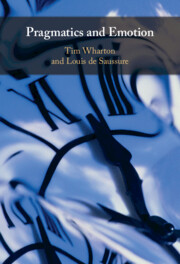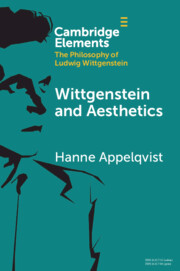Refine search
Actions for selected content:
11 results
The God of falsehoods (or nonsense). Against Lebens’ apophatic theology
-
- Journal:
- Religious Studies , First View
- Published online by Cambridge University Press:
- 22 July 2025, pp. 1-13
-
- Article
-
- You have access
- Open access
- HTML
- Export citation
Chapter 4 - The Fish Tale: The Unity of Language and the World in Light of TLP 4.014
-
-
- Book:
- Wittgenstein's <I>Tractatus Logico-Philosophicus</I>
- Published online:
- 07 March 2024
- Print publication:
- 14 March 2024, pp 69-89
-
- Chapter
- Export citation
8 - Pragmatics and Emotion
-
- Book:
- Pragmatics and Emotion
- Published online:
- 13 December 2023
- Print publication:
- 21 December 2023, pp 144-148
-
- Chapter
- Export citation
2 - Pragmatics and Emotion
-
- Book:
- Pragmatics and Emotion
- Published online:
- 13 December 2023
- Print publication:
- 21 December 2023, pp 13-28
-
- Chapter
- Export citation

Pragmatics and Emotion
-
- Published online:
- 13 December 2023
- Print publication:
- 21 December 2023
An Ineffable Haunting: Language, Embodiment, and Ghosts in Toni Morrison’s Beloved
-
- Journal:
- Cambridge Journal of Postcolonial Literary Inquiry / Volume 11 / Issue 1 / January 2024
- Published online by Cambridge University Press:
- 24 November 2023, pp. 36-53
-
- Article
-
- You have access
- Open access
- HTML
- Export citation
Language and doctrine in Parmenides’ Way of Reality
-
- Journal:
- The Journal of Hellenic Studies / Volume 143 / November 2023
- Published online by Cambridge University Press:
- 04 September 2023, pp. 250-275
- Print publication:
- November 2023
-
- Article
-
- You have access
- Open access
- HTML
- Export citation

Wittgenstein and Aesthetics
-
- Published online:
- 17 February 2023
- Print publication:
- 09 March 2023
-
- Element
-
- You have access
- Open access
- HTML
- Export citation
Prologue
-
- Book:
- Hermetic Spirituality and the Historical Imagination
- Published online:
- 16 June 2022
- Print publication:
- 30 June 2022, pp 1-10
-
- Chapter
- Export citation
10 - The Conquest of Time
-
- Book:
- Hermetic Spirituality and the Historical Imagination
- Published online:
- 16 June 2022
- Print publication:
- 30 June 2022, pp 308-351
-
- Chapter
- Export citation
19 - Mysticism and transcendence
- from PART IV - SHAPES OF A CHRISTIAN WORLD
-
-
- Book:
- The Cambridge History of Christianity
- Published online:
- 28 March 2010
- Print publication:
- 02 July 2009, pp 297-308
-
- Chapter
- Export citation
